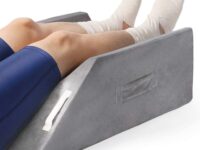Experiencing discomfort or the sensation that your knee might bend backward while walking can be alarming and disruptive to your daily activities. This sensation, often accompanied by feelings of instability, can stem from various underlying issues related to the knee joint and its surrounding structures. Understanding the potential causes and seeking appropriate treatment is crucial for managing this condition and restoring mobility and comfort.
Causes of the Sensation: Several factors can contribute to the feeling that your knee will bend backward during walking. These include ligamentous laxity, muscular imbalances, structural abnormalities, arthritis, and previous knee injuries. Conditions such as ACL injuries, patellar maltracking, meniscal tears, and arthritis can all lead to sensations of instability and discomfort while walking.
Ligamentous Laxity: The anterior cruciate ligament (ACL) plays a vital role in stabilizing the knee joint during movement. Injury or laxity in this ligament can cause the knee to feel unstable and susceptible to bending backward while walking. Ligamentous laxity may result from acute trauma, repetitive stress, or underlying anatomical factors.
Muscular Imbalances: Weakness or imbalance in the muscles surrounding the knee joint, including the quadriceps, hamstrings, and calf muscles, can disrupt normal knee mechanics and stability. Muscular imbalances may lead to abnormal stress on the knee joint during walking, contributing to sensations of instability and the perception that the knee will bend backward.
Structural Abnormalities: Structural abnormalities within the knee joint, such as patellar maltracking or cartilage damage, can interfere with the smooth movement of the knee during walking. These abnormalities may cause the knee to feel as though it will bend backward or give way due to irregular motion and alignment issues.
Arthritis: Osteoarthritis and rheumatoid arthritis can affect the knee joint’s stability and function over time. As the joint surfaces degrade and inflammation sets in, individuals may experience sensations of the knee buckling or giving way while walking. Arthritis-related changes can contribute to feelings of instability and discomfort in the knee joint.
Previous Knee Injuries: Individuals with a history of knee injuries, such as ligament sprains, meniscal tears, or fractures, may experience lingering sensations of instability and discomfort while walking. These injuries can disrupt normal knee mechanics and increase the risk of future episodes of instability or the feeling of the knee bending backward.
Seeking Treatment: If you experience the sensation of your knee bending backward while walking, it is essential to seek evaluation and treatment from a healthcare professional. A thorough assessment, which may include physical examination, imaging studies, and diagnostic tests, can help determine the underlying cause of your symptoms.
Treatment options may vary depending on the specific diagnosis but may include physical therapy, bracing, medications, and in some cases, surgical intervention. Physical therapy focuses on strengthening the muscles around the knee joint, improving flexibility, and correcting movement patterns to enhance stability and function.
The sensation of feeling like your knee will bend backward while walking can be indicative of underlying issues affecting the stability and function of the knee joint. By understanding the potential causes and seeking appropriate treatment, individuals can address discomfort, improve mobility, and restore quality of life. Early intervention and a comprehensive treatment approach are essential for managing symptoms and preventing long-term complications associated with knee instability.
Experiencing a sensation that your knee might bend backward while walking can be distressing and may indicate underlying issues with the knee joint or surrounding structures. This sensation can arise due to various reasons, ranging from minor muscular strain to more serious conditions involving the knee joint’s stability and alignment.
One potential cause for the feeling of your knee bending backward while walking could be related to issues with the knee’s ligaments. The anterior cruciate ligament (ACL) is a crucial stabilizing structure in the knee joint, and injury or laxity in this ligament can lead to sensations of instability and the perception that the knee might give way.
Muscular imbalances or weakness around the knee joint can also contribute to the sensation of the knee bending backward during walking. Muscles such as the quadriceps, hamstrings, and calf muscles play essential roles in stabilizing and supporting the knee during movement. Weakness or imbalance in these muscles can lead to abnormal stresses on the knee joint and altered biomechanics, potentially resulting in sensations of instability.
Knee Feels Like it will Bend Backwards When Walking
Additionally, conditions such as patellar maltracking or instability can cause abnormal movement patterns within the knee joint during walking. Patellar maltracking occurs when the patella (kneecap) does not properly align and track within its groove, leading to irregular movement and potential sensations of the knee giving way or bending backward.
In some cases, structural abnormalities within the knee joint, such as meniscal tears or cartilage damage, can also contribute to feelings of instability and the sensation that the knee might bend backward while walking. These issues can interfere with the smooth gliding motion of the knee joint, leading to discomfort and instability during weight-bearing activities like walking.
Arthritis, whether osteoarthritis or rheumatoid arthritis, can also affect the knee joint’s stability and function. As the joint surfaces degrade and inflammation sets in, individuals may experience sensations of the knee buckling or giving way, which can mimic the feeling of the knee bending backward during walking.
It’s essential to consider any recent trauma or injury to the knee that might have triggered the sensation of it bending backward while walking. Acute injuries such as ligament sprains, meniscal tears, or fractures can cause sudden instability and discomfort, making walking and weight-bearing activities challenging.
An evaluation by a healthcare professional, such as an orthopedic surgeon or a physical therapist, can help identify the underlying cause of the sensation and guide appropriate treatment. Depending on the diagnosis, treatment may include physical therapy to strengthen the muscles around the knee, bracing or taping for added support, or even surgical intervention in cases of significant ligamentous or structural damage.
In the meantime, it’s important to avoid activities that exacerbate the sensation of the knee bending backward and to modify your movement patterns to minimize stress on the joint. Using assistive devices such as a cane or brace may also help improve stability and reduce discomfort while walking.
Maintaining a healthy weight, staying active with low-impact exercises, and practicing proper body mechanics can also support overall knee health and reduce the risk of further discomfort or instability. Additionally, incorporating flexibility and strengthening exercises targeted at the muscles surrounding the knee joint can help improve stability and function over time.
In conclusion, the Knee Feels Like it will Bend Backwards When Walking sensation of the knee bending backward while walking can stem from various underlying issues affecting the knee joint’s stability, including ligamentous laxity, muscular weakness, structural abnormalities, arthritis, or recent trauma. Seeking prompt evaluation and appropriate treatment can help address the underlying cause and alleviate discomfort, allowing for improved mobility and function in daily activities.







